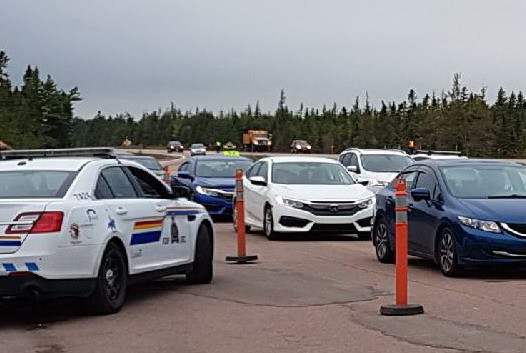Road safety is a shared responsibility involving police, motorists and pedestrians. Each has a role in making sure they are following the rules of the road. Making the decision to push the boundaries could lead to a crash that seriously injures someone or even worse, causes death.
When it comes to motor vehicle infractions there are many, ranging from impaired driving, to failing to wear a seatbelt, to failing to stop for a traffic light or stop sign and speeding. And it is still common for police to find motorists driving without a licence, an expired vehicle inspection or a vehicle registration that is out of date.
Ensuring the roads are safe is a priority for the RCMP in New Brunswick and we take driving offences seriously. The RCMP is responsible for policing a large percentage of the 18,000 kilometres of highway and secondary roads in this province. This includes not only the TransCanada highway, but also the numerous roadways that link all of our communities. Secondary roads are where we see the highest percentage of serious and fatal crashes occur. The enforcement of driving laws is constant, with every RCMP officer doing their part to keep our roads safe. Each RCMP officer in New Brunswick, is responsible for ensuring traffic laws are obeyed and to enforce the law regardless of the location of their detachment, their rank or their specific duties.
But to be effective it's important for the RCMP to be strategic, to focus on those violations and/or sections of highway that present risks for people that could mean being seriously injured or lose their lives in crashes. We re-visited our approach to Traffic and created a Tactical Traffic Enforcement Unit, commonly referred to as TTEU. Traffic enforcement must have a purpose and, with the help of an analyst, we are able to determine where our enforcement efforts will have the greatest impact. The members assigned to the TTEU focus on driving behaviours that present the greatest risk to the public, whether it be driving behaviours or criminal activity. This means looking at where the serious collisions are happening, the causes for those crashes and then implementing an enforcement plan that results in a reduction in those crashes.
It's during the traffic enforcement that they are contributing to improving safety on the roads, either through enforcement or often through education by talking to drivers. The unit members are strategically positioned throughout the province to be able to address specific traffic issues over and above what all police officers are doing. Besides Traffic enforcement, education and prevention are also necessary and that's where checkstops play an important role. From April 1 to June 30, 2018 we conducted 1689 checkstops in the province. This means that police interacted with thousands of motorists as vehicle registration, inspection, insurance and driver's licenses were checked. During these checkstops impaired motorists are often detected and consequently removed from the road. In 2017 the RCMP NB checked more than 355,000 vehicles that were travelling on provincial highways.
Other statistics from April to June this year shows that RCMP in New Brunswick issued 4885 tickets for motor vehicle infractions, and another 1985 tickets to motorists failing to have proper insurance or other moving violations. In addition 496 drivers were found to have been driving while prohibited, disqualified or with a suspended licence. And 900 drivers were found to be impaired while behind the wheel. Recent legislative changes also allow for a driver's licence to be suspended on the spot.
Up to the middle of August this year, there have been 32 motor vehicle collisions on roadways patrolled by the RCMP resulting in 39 fatalities. For the entire year of 2017 there were 62 collisions causing 66 fatalities.
Enforcement happens 24 hours a day, seven days a week on all roadways but it's concentrated on areas where the evidence shows there is a higher likelihood of a crash or collision. It typically means our police officers are frequently on secondary roads with two-way traffic.
Safe roads means more than just police action. We regularly receive calls from the public reporting vehicles speeding or driving aggressively, impaired drivers and distracted driving. We appreciate these calls as it alerts us to areas where driving behaviours could lead to a crash. These calls may have prevented a serious injury or worse a death.
The RCMP in New Brunswick also shares regular safety messaging on social media to keep dangerous issues such as not wearing seatbelts, speeding and impaired driving in front of the public.
Whenever you get into a vehicle remember the rules of the road and know that somewhere along your travels we are also on the highway where the risk is greatest to your safety as a motorist.
